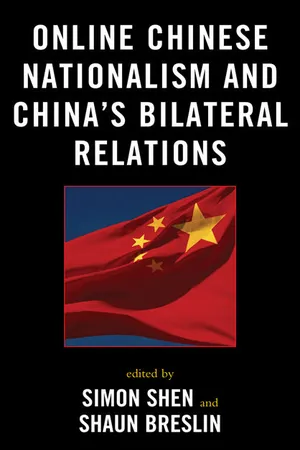
- English
- ePUB (mobile friendly)
- Available on iOS & Android
eBook - ePub
Online Chinese Nationalism and China's Bilateral Relations
About this book
Since the Chinese were officially plugged into the virtual community in 1994, the usage of the internet in the country has developed at an incredible rate. By the end of 2008, there were approximately 298 million netizens in China, a number which surpasses that of the U.S. and ranks China the highest user in the world. The rapid development of the online Chinese community has not only boosted the information flow among citizens across the territory, but has also created a new form of social interaction between the state, the media, various professionals and intellectuals, as well as China's ordinary citizens. Although the subject of this book is online Chinese nationalism, which to a certain extent is seen as a pro-regime phenomenon, the emergence of an online civil society in China intrinsically provides some form of supervision of state power-perhaps even a check on it. The fact that the party-state has made use of this social interaction, while at the same time remaining worried about the negative impact of the same netizens, is a fundamental characteristic of the nature of the relationship between the state and the internet community.
Many questions arise when considering the internet and Chinese nationalism. Which are the most important internet sites carrying online discussion of nationalism related to the author's particular area of study? What are the differences between online nationalism and the conventional form of nationalism, and why do these differences exist? Has nationalist online expression influenced actual foreign policy making? Has nationalist online expression influenced discourse in the mainstream mass media in China? Have there been any counter reactions towards online nationalism? Where do they come from? Online Chinese Nationalism and China's Bilateral Relations seeks to address these questions.
Many questions arise when considering the internet and Chinese nationalism. Which are the most important internet sites carrying online discussion of nationalism related to the author's particular area of study? What are the differences between online nationalism and the conventional form of nationalism, and why do these differences exist? Has nationalist online expression influenced actual foreign policy making? Has nationalist online expression influenced discourse in the mainstream mass media in China? Have there been any counter reactions towards online nationalism? Where do they come from? Online Chinese Nationalism and China's Bilateral Relations seeks to address these questions.
Frequently asked questions
Yes, you can cancel anytime from the Subscription tab in your account settings on the Perlego website. Your subscription will stay active until the end of your current billing period. Learn how to cancel your subscription.
At the moment all of our mobile-responsive ePub books are available to download via the app. Most of our PDFs are also available to download and we're working on making the final remaining ones downloadable now. Learn more here.
Perlego offers two plans: Essential and Complete
- Essential is ideal for learners and professionals who enjoy exploring a wide range of subjects. Access the Essential Library with 800,000+ trusted titles and best-sellers across business, personal growth, and the humanities. Includes unlimited reading time and Standard Read Aloud voice.
- Complete: Perfect for advanced learners and researchers needing full, unrestricted access. Unlock 1.4M+ books across hundreds of subjects, including academic and specialized titles. The Complete Plan also includes advanced features like Premium Read Aloud and Research Assistant.
We are an online textbook subscription service, where you can get access to an entire online library for less than the price of a single book per month. With over 1 million books across 1000+ topics, we’ve got you covered! Learn more here.
Look out for the read-aloud symbol on your next book to see if you can listen to it. The read-aloud tool reads text aloud for you, highlighting the text as it is being read. You can pause it, speed it up and slow it down. Learn more here.
Yes! You can use the Perlego app on both iOS or Android devices to read anytime, anywhere — even offline. Perfect for commutes or when you’re on the go.
Please note we cannot support devices running on iOS 13 and Android 7 or earlier. Learn more about using the app.
Please note we cannot support devices running on iOS 13 and Android 7 or earlier. Learn more about using the app.
Yes, you can access Online Chinese Nationalism and China's Bilateral Relations by Simon Shen,Shaun Breslin in PDF and/or ePUB format, as well as other popular books in Politics & International Relations & Computer Science General. We have over one million books available in our catalogue for you to explore.
Information
Table of contents
- Figures
- Tables
- Acknowledgments
- I INTRODUCTION
- 1 When China Plugged In: Structural Origins of Online Chinese Nationalism
- 2 Nationalism-On-Demand? When Chinese Sovereignty Goes Online
- II THE FIRST LAYER: JAPAN, TAIWAN, AND THE UNITED STATES
- 3 China’s Online Nationalism Toward Japan
- 4 Networking Anti-Japanese Protests Popular Sovereignty Reasserted since 2005*
- 5 Alternative Online Chinese Nationalism Response to the Anti-Japanese Campaign in China on Hong Kong’s Internet
- 6 Ethnocentric Perception Re-explored Online Chinese Nationalism Toward Taiwan
- 7 The “Two Americas” Dichotomy Online Chinese Nationalism Toward the United States*
- III THE SECOND LAYER: THE REST OF THE WORLD
- 8 Beyond Sino-ASEAN Relations Online Chinese Nationalism Toward Southeast Asia*
- 9 Online Chinese Nationalism Toward the European Union Economic and Diplomatic Implications of the Olympic Torch Relay Protests
- 10 Online Nationalism and Sino-UK Relations
- 11 A Constructed (Un)Reality on China’s Reentry into Africa The Chinese Online Community Perception of Africa*
- 12 Discussions on Sino-Latin American Relations in Qiangguo Forums (or the Lack Thereof)
- IV CONCLUSION
- 13 Online Chinese Nationalism(s) Comparisons and Findings
- Index
- About the Editors and Contributors